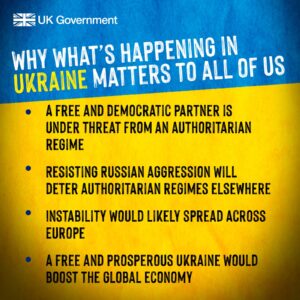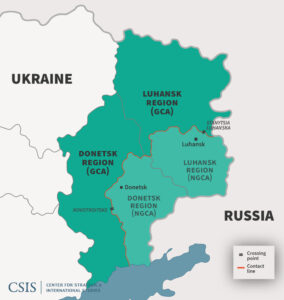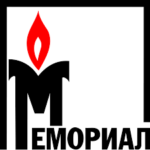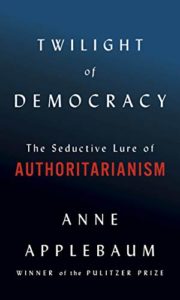Protest is dangerous. Talk of democracy & political change is dangerous. To keep them from spreading, Russia’s rulers must maintain careful control over the life of the nation, @NEDemocracy board member @anneapplebaum writes for @TheAtlantic https://t.co/IlFibOpyBK
— Democracy Digest (@demdigest) February 3, 2022
How do we explain the “extraordinary significance” that Vladimir Putin attaches to Ukraine?
Of course Ukraine matters as a symbol of the lost Soviet empire. Ukraine was the second-most-populous and second-richest Soviet republic, and the one with the deepest cultural links to Russia, notes Pulitzer Prize-winning historian Anne Applebaum. But modern, post-Soviet Ukraine also matters because it has tried—struggled, really—to join the world of prosperous Western democracies, she writes for The Atlantic.
 Ukraine has staged not one but two prodemocracy, anti-oligarchy, anti-corruption revolutions in the past two decades. The most recent, in 2014, was particularly terrifying for the Kremlin, adds Applebaum (right), a board member of the National Endowment for Democracy (NED). Young Ukrainians were chanting anti-corruption slogans, just like the Russian opposition does, and waving European Union flags. These protesters were inspired by the same ideals that Putin hates at home and seeks to overturn abroad.
Ukraine has staged not one but two prodemocracy, anti-oligarchy, anti-corruption revolutions in the past two decades. The most recent, in 2014, was particularly terrifying for the Kremlin, adds Applebaum (right), a board member of the National Endowment for Democracy (NED). Young Ukrainians were chanting anti-corruption slogans, just like the Russian opposition does, and waving European Union flags. These protesters were inspired by the same ideals that Putin hates at home and seeks to overturn abroad.
By threatening Ukraine’s sovereignty, Putin has done something President Joe Biden could not on his own — unite the West, notes The FT’s Edward Luce.
 The Ukraine crisis also affirms that “geopolitical strength is determined not by how much economic power you can wield but by how much pain you can endure,” argues a permanent fellow at the Institute for Human Sciences in Vienna. “Your enemy, unlike during the Cold War, is not somebody behind an iron curtain but somebody with whom you trade, from whom you get gas and to whom you export high-tech goods. Soft power has given way to resilience,” he writes for The New York Times.
The Ukraine crisis also affirms that “geopolitical strength is determined not by how much economic power you can wield but by how much pain you can endure,” argues a permanent fellow at the Institute for Human Sciences in Vienna. “Your enemy, unlike during the Cold War, is not somebody behind an iron curtain but somebody with whom you trade, from whom you get gas and to whom you export high-tech goods. Soft power has given way to resilience,” he writes for The New York Times.
Forcing Kyiv and its leadership back into Russia’s orbit is unfinished business for Moscow
and Putin, Brookings expert Fiona Hill told a hearing of the U.S. Commission on Security and Cooperation in Europe.
The past two years have seen significant changes in Eurasia, where developments seem to have reached a tipping point, she added, outlining Russia’s Assault on Ukraine and the International Order. Thirty years since the dissolution of the Soviet Union in December 2021, and 22 years since Vladimir Putin came to power, Moscow has successfully reasserted itself as the dominant political force and security provider in the region.
Only Ukraine and the three Baltic States that achieved membership in both NATO and the European Union in 2004 have managed to stay beyond Moscow’s grip, said Hill. RTWT
Moscow and Beijing stand to benefit if there is doubt over whether the U.S. can defend democracy in Ukraine, said Daniel Russel, a senior official in the Obama administration. “What’s driving them together is their common interest in undercutting the U.S.,” he told The Wall Street Journal.
 For many years, German foreign policy has been based on the precept of “Wandel durch Handel” – change through trade – or “Wandel durch Verflechtung” – change through interconnection – reflecting the belief that deepening economic and other ties can foster political change, Reuters reports.
For many years, German foreign policy has been based on the precept of “Wandel durch Handel” – change through trade – or “Wandel durch Verflechtung” – change through interconnection – reflecting the belief that deepening economic and other ties can foster political change, Reuters reports.
The Ukraine stand-off, alongside developments in Russia and China, should prompt Germany to reassess its long-held strategy of seeking to bring about change in authoritarian societies through rapprochement, said Lars Klingbeil, the co-leader of the ruling Social Democrats (SPD).
“We haven’t found a convincing way to deal with authoritarian states,” he told Reuters. “I wonder if the decades-old concept of trying to bring about change in a country through closer ties and economic relations is still relevant.
“When you look at Russia, you simply have to acknowledge that the domestic situation has massively worsened in recent years,” Klingbeil added.
Frontline of battle between democracy & autocracy
Ukraine matters for another reason, said William B. Taylor, a former U.S. Ambassador to Ukraine and Vice President for Russia and Europe at the United States Institute of Peace. Even though it is an old civilization and culture – centuries older than Russia — it is a young nation of 45 million people, the vast majority of whom seek nothing more than the ability to live a normal life as a normal European country, able to choose its leaders, able to choose its trading partners, able to choose its security alliances, able to choose its political partners.
It is the frontline of the battle between democracy and autocracy, he told the OSCE hearing. We should support them. With our support, they will prevail. Putin will lose.

CSIS
Civil society organizations have developed contingency plans in case of a renewed invasion of Ukraine, but the current arrangement of Russian forces poses a challenge on how to put those plans into action, notes a CSIS analysis:
Organizations providing assistance to people in need in eastern Ukraine are hesitant to relocate their resources and personnel before knowing whether an invasion will happen and, in that eventuality, whether their fallback locations themselves are safe. Additionally, there is a sense among civil society actors providing humanitarian assistance that responding prematurely to the risk of a Russian invasion would adversely impact conditions for people already living in conflict-affected areas who rely on their support to meet basic needs.
Battling Russian disinformation campaigns, civil society groups are working to address these concerns and are engaged in frequent information sharing, both informally and through the United Nations’ in-country cluster system, CSIS adds. RTWT
Zelensky wants to downplay the Russian threat because it’s hurting the economy and his chances at a second term, says Melinda Haring, the deputy director of the Atlantic Council’s Eurasia Center. Zelensky and his team do not disagree with the U.S. intelligence assessments that Washington has shared with them. He disagrees with the interpretation—and how it plays into his future plans, she writes for The National Interest.
 Totalitarian traits
Totalitarian traits
The imprisonment of Alexei Navalny and the closure of the International Memorial Society and the Memorial Human Rights Center represent a clear break with the legacy of former Soviet leader Mikhail Gorbachev’s glasnost and perestroika, adds Maria Domańska, a senior fellow at the Centre for Eastern Studies (OSW) in Warsaw, Poland. They invoke totalitarian traits. They reflect how the Kremlin is seeking a monopoly on shaping the historical discourse, including that of Ukraine, she writes for Carnegie Europe.
Russia’s ‘politics of memory’ carries the message, ‘Forward, into the past! in service of ‘eternal’ authoritarianism, Domańska suggests.
Europeans are right to believe that Russia’s invasion of Ukraine is not inevitable — and may even be correct that it’s not the most likely scenario, notes Krastev, a prominent analyst and contributor to the National Endowment for Democracy‘s Journal of Democracy. But we cannot deceive ourselves that we can skip the resilience test. “If you invite a bear to dance, it’s not you who decides when the dance is over,” the Russian proverb goes. “It’s the bear.”
 Putin wants to destabilize Ukraine, frighten Ukraine. He wants Ukrainian democracy to fail. He wants the Ukrainian economy to collapse. He wants foreign investors to flee, adds Applebaum:
Putin wants to destabilize Ukraine, frighten Ukraine. He wants Ukrainian democracy to fail. He wants the Ukrainian economy to collapse. He wants foreign investors to flee, adds Applebaum:
He wants his neighbors—in Belarus, Kazakhstan, even Poland and Hungary—to doubt whether democracy will ever be viable, in the longer term, in their countries too. Farther abroad, he wants to put so much strain on Western and democratic institutions, especially the European Union and NATO, that they break up. He wants to keep dictators in power wherever he can, in Syria, Venezuela, and Iran. He wants to undermine America, to shrink American influence, to remove the power of the democracy rhetoric that so many people in his part of the world still associate with America. He wants America itself to fail.
Putin’s beloved Soviet Union also had big, unachievable goals. Lenin, Stalin, and their successors wanted to create an international revolution, to subjugate the entire world to the Soviet dictatorship of the proletariat, she concludes. Ultimately, they failed—but they did a lot of damage while trying. Putin will also fail, but he too can do a lot of damage while trying. And not only in Ukraine.
“What is Putin really afraid of? He is afraid of Ukrainian democracy succeeding in the long term,” said Latvian Prime Minister Krišjānis Kariņš. “Democracy in Ukraine ultimately could be infectious – that is democracy and democratic demands – in Russia itself.” pic.twitter.com/iHBEAH6a0K
— Power & Politics (@PnPCBC) February 2, 2022







